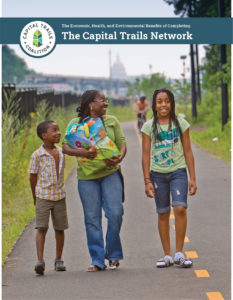The Capital Trails Coalition recognizes long-standing and current societal inequities that have their roots in generations of unjust structural barriers, policies, practices, attitudes, language and cultural messages have disproportionately impacted many minority groups.
Therefore, the Coalition will promote an equitable trails network by analyzing the unique challenges and circumstances impacting specific populations’ mobility, safety and connectivity needs.
The Coalition will use this information to offer and advocate for solutions so that the trail network more effectively serves all residents, including current and potential trail users.
The Coalition will also use this lens proactively to influence its own structure and decision making framework.
Values Addendum
Definitions:
Minority Groups: including, but not limited to people of color, low income, older persons, LGBTQ, Women, individuals with limited English proficiency, persons with disabilities; returning citizens;
Mobility: how far one can travel in a given period of time, accounting for cost, safety, and reliability. Development of an equitable trail network provides mobility for all users, creating a direct, convenient, affordable transportation option.
Safety: minimized conflicts between bicyclists, pedestrians, and other travel modes, as well as measures to promote personal safety and security. Implementation may include signed trail use guidelines, adequate lighting, and application of AASHTO design standards.
Connectivity: access to services and destinations, provided by a navigable, comprehensive network. Strategies promoting equitable connectivity could include frequent neighborhood trailheads, wayfinding and other signage, accessible maps, and ADA compliant design.

